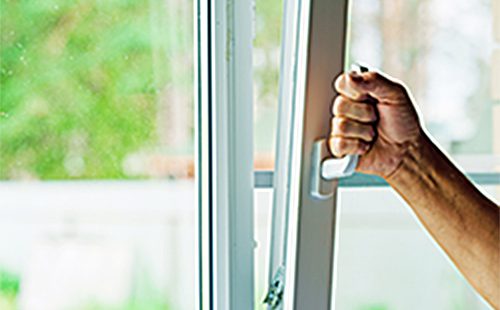Good windows last for quite a long time. This is particularly true of PVC windows, because, as we know, plastic does not rot or decay, and with proper maintenance their service life can be impressive indeed.
PVC windows are fortified before they leave the production line
The durability of windows is affected by climate, air pollution, mechanical factors, and humidity in indoor air, but PVC windows are highly resistant to all of this. Plastic neither rots nor decays, and is able to withstand even the harshest weather conditions for a very long time. The edges of windows made by Klaasmerk are fortified against potential damage due to dust, moisture, UV radiation, and frost before they leave the production line.
To ensure durability, external sills must also be installed correctly: they help direct water away from the windows and prevent it from getting into the structure. After installation, the edge of the window frame should be covered with a protective finish within a reasonable time.
Window profiles and glazing should never be cleaned using sharp objects (metal putty knives, knives, steel brushes, etc.) – these can cause permanent damage to the surface of the window.
To restore the shine, a bit of polishing is all it takes
Plastic windows do not require painting. Thus, unlike wooden windows, you never have to worry about renewing the paint of PVC window profiles. With proper care you can be assured that a quality PVC profile will never yellow or deteriorate in any other manner. Should your windows begin to fade due to external conditions, all it takes to restore the shine is to polish the sashes and frames every few years or as necessary. Heavily soiled surfaces can be cleaned using a special PVC door and window cleaner.
Maintenance is the key to a long life
If the window is installed properly, regular maintenance is easy – doubly so with plastic windows from Klaasmerk. The most important thing you can do for your windows is to clean the seals and treat them with silicone.
Regular lubrication adds at least a few years to the window and can easily be performed by anyone. Once a year, it is a good idea to open the window and apply a few drops of silicone oil to the little markers on the fittings. All moving parts require lubrication, as they are inevitably exposed to a certain amount of dust. The general rule is: if it moves, apply lube.
Seals also play a significant role in the life of your windows and should be treated with silicone oil at least once a year. Just apply a bit of the oil on a piece of cloth and give the seals a light wipe. Untreated seals wear out faster and are prone to sticking. If the airtightness of your window is compromised, the likely cause is a degraded seal.
Seals need replacing
Every ten years or so, the seals need to be replaced, but there is nothing difficult about this either. In PVC window profiles, the seals are fitted in a special groove, which makes replacement a ten-minute affair. PVC windows use two types of seals: weldable PCE seals and regular EPDM seals. Old seals are replaced with the latter. Both types of seals are durable and weatherproof, but, of course, time still takes its toll. Thus, old window seals manufactured 10–15 years ago are nearing the end of their life. The seals used in modern windows are more durable and will last at least five years longer.
When replacing the seals of your windows, be sure to choose the right thickness, as different profiles sometimes use different seals and the wrong thickness can reduce the airtightness of the window.
Replacing window seals is easy: just grab the end of the seal and tear it off, clean the window aperture and the seal groove of stuck debris with the tip of a knife, wash and dry, then install the new seal.
With regard to seal maintenance, whenever you order a window from us, we will inform you of whether the window uses replaceable seals, what the replacement procedure is, and whether you can do it yourself or need to call in a specialist.
Your PVC window will probably outlive you
Plastic window technology was developed 60 years ago, and the estimated lifespan of plastic is about 100 years. These days, many plastic windows have been installed in buildings for over 30 years, and we have yet to hear of them being replaced due to deterioration. So it is impossible to say how long plastic windows can last in practice, but one thing is certain: with proper maintenance, PVC windows are sure to live through at least one human lifetime.
Furthermore, plastic windows are suitable for everyone. PVC is chemically stable and safe for human health, which means that plastic windows are also suitable for people with allergies.



